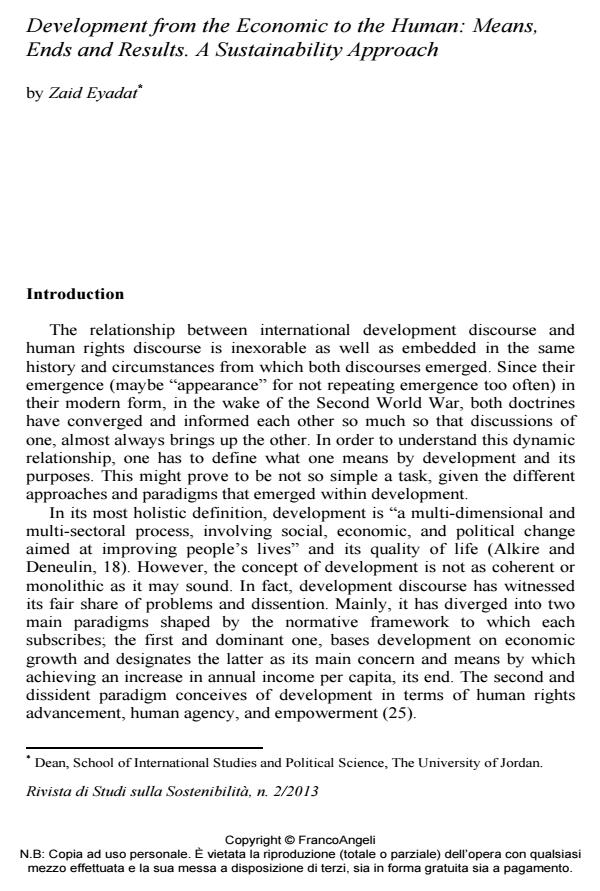Development from the Economic to the Human: Means, Ends and Results. A Sustainability Approach
Titolo Rivista RIVISTA DI STUDI SULLA SOSTENIBILITA'
Autori/Curatori Zaid Eyadat
Anno di pubblicazione 2014 Fascicolo 2013/2 Lingua Inglese
Numero pagine 20 P. 39-58 Dimensione file 891 KB
DOI 10.3280/RISS2013-002003
Il DOI è il codice a barre della proprietà intellettuale: per saperne di più
clicca qui
Qui sotto puoi vedere in anteprima la prima pagina di questo articolo.
Se questo articolo ti interessa, lo puoi acquistare (e scaricare in formato pdf) seguendo le facili indicazioni per acquistare il download credit. Acquista Download Credits per scaricare questo Articolo in formato PDF

FrancoAngeli è membro della Publishers International Linking Association, Inc (PILA)associazione indipendente e non profit per facilitare (attraverso i servizi tecnologici implementati da CrossRef.org) l’accesso degli studiosi ai contenuti digitali nelle pubblicazioni professionali e scientifiche
The dynamic relationship between international development discourse and human rights discourse is inexorable as well as embedded in the same history and circumstances from which both discourses emerged. Human rights paradigm represent an intrinsic part of and give meaning to human development, while development approach represents the means and processes necessary to realizing human rights. This paper argues that the extent and success of human development could be measured in terms of its success in advancing and making possible the attainment of human rights through adjusting social, political, and economic structures. This paper utilizes Jordan as a case-study.
Il saggio analizza la complessa relazione dinamica che intercorre tra diritto allo sviluppo umano e diritti umani. L’autore propone un quadro interpretativo delle traiettorie di sviluppo umano e sostenibile, che vada "oltre il Pil", considerando accanto alla dimensione economica anche quella dei diritti umani. Analizzando il caso della Giordania, l’Autore sottolinea che la misurazione delle traiettorie di sviluppo umano rappresenta uno strumento utile e necessario per i policy maker, in modo che possano svolgere in maniera consapevole la loro azione di advocacy in merito ai bisogni della loro comunità.
Keywords:Sostenibilità, diritti umani, sviluppo umano, politiche sociali, Giordania
- Alkire S., and Deneulin S. (2009). A Normative Framework for Development. In: Deneulin S. and Shahani L. (ed.) (2009). An Introduction to the Human Development and Capability Approach. London: Earthscan, pp. 3-22.
- Alkire S., and Deneulin S. (2009). The Human Development and Capability Approach. In: Deneulin S. and Shahani L. (ed.) (2009). An Introduction to the Human Development and Capability Approach. London: Earthscan, pp. 22-49.
- Brougère F. (2013). Martha Nussbaum ou la démocratie des capabilities. In: La vie des idees. Web 30 July 2013 http://www.laviedesidees.fr/IMG/pdf/20130319_de_mocratie_des_capabilite_s.pdf.
- Campbell B. (1997). Reconceptualisation de l’État au Sud – Participation démocratique ou Managérialisme populiste. In: Crepeau F. (ed) Mondialisation des échanges et Fonctions de l’État. Bruxelles: Bruylant, pp. 163-231.
- Deneulin S. (2009). Ideas Related to Human Development. In: Deneulin S. and Shahani L. (ed.) (2009). An Introduction to the Human Development and Capability Approach. London: Earthscan, pp. 51-71.
- Finnemore M. (1997). Redefining Development at the World Bank. In: Cooper F. and Packard R. (1997). International Development and the Social Sciences: Essays on the History and Politics of Knowledge. Berkeley: Univ. of California, pp. 203-28.
- Human Development Report 2010. Rep. no. 20. UNDP. Web. 30 Dec. 2010. http://hdr.undp.org/en/mediacentre/.
- Jordan Small Business and Human Development Jordan Human Development Report 2011 UNDP Amman Web 30 July 2013 http://www.undp-jordan.org/index.php?page_type=publications&press_id=197.
- Kuonqui C. (2006). Is Human Development a New Paradigm for Development? Capabilities Approach, Neoliberalism and Paradigm Shifts. The August International Conference “Freedom and Justice” of the Human Development and Capability Association (HDCA). Netherlands, Groningen. Paper.
- Legouté J. R. (2001). Définir le Développement: Historique et Dimensions D’un Concept Plurivoque. Economie Politique Internationale, 1, 1, February.
- McNeill D. (2007). ‘Human Development’: The Power of the Idea. Journal of Human Development, 8, 1, March, pp. 5-22.
- Nussbaum M. (1999). Sex and Social Justice. New York: Oxford University Press.
- Nussbaum M. (2006). Frontiers of Justice Disability, Nationality, Species Membership. Boston: Harward University Press.
- Peet R. (2003). Unholy Trinity: the IMF, World Bank and WTO. Malaysia: Zed. Print.
- Rist G. (2002). The History of Development: From Western Origins to Global Faith. London: Zed.
- Roney W. (1972). How Europe Underdeveloped Africa. London: Bogle-L’Ouverture Publications.
- Sen A. (1999). Development as Freedom. New York: Knopf.
- “Sustainable Development in a Diverse World” website available at http://www.susdiv.org/ access on 03 Agoust 2013.
- The Jordan National Agenda 2006-2015. Web. 29 July 2013. http://www.nationalagenda.jo/default.aspx.
- United Nations General Assembly (1987) Report of the World Commission on Environment and Development: Our Common Future. Transmitted to the General Assembly as an Annex to document A/42/427.
- United Nations General Assembly (2005). 2005 World Summit Outcome, Resolution A/60/1, adopted by the General Assembly on 15 September 2005.
- United nation Global Compact Program available at http://www.unglobalcompact.org/ access on 03 August 2013.
Zaid Eyadat, Development from the Economic to the Human: Means, Ends and Results. A Sustainability Approach in "RIVISTA DI STUDI SULLA SOSTENIBILITA'" 2/2013, pp 39-58, DOI: 10.3280/RISS2013-002003